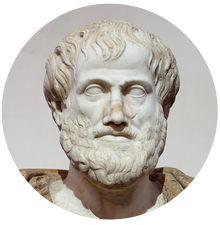Introduction
In Aristotle’s renowned text on ethics (c. 350-322 B.C.), this student of Plato argues that happiness consists in “activity of the soul in accordance with virtue” - for example, with moral virtues, such as courage, generosity and justice, and intellectual virtues, such as knowledge, wisdom and insight. The text is believed to be based on the notes from a series of lectures which Aristotle gave at the Lyceum; it would go on to become one of the core works of medieval philosophy due to the enduring answers it offers to the eternal question of how human beings ought to live.
Recommended Reading
Aristotle, Nicomachean Ethics, trans. by Terence Irwin, Hackett Publishing Company, 2019.
To download a short excerpt, please click on the link below:
Recommended Reading
Aristotle, Nicomachean Ethics, trans. by Terence Irwin, Hackett Publishing Company, 2019.
To download a short excerpt, please click on the link below:
| fypa5nicomacheanethics.pdf | |
| File Size: | 49 kb |
| File Type: | |
Questions for Reflection and Discussion
Both Plato and Aristotle seek ‘the Good’. What do they mean by this? How are their conclusions and approaches similar? How are they different?
Do you agree with Aristotle’s idea of ‘eudaimonia’? Why or why not?
Is virtue something human beings can acquire for themselves?
Do you agree with Aristotle’s idea of ‘eudaimonia’? Why or why not?
Is virtue something human beings can acquire for themselves?
“The man who shuns and fears everything and stands up to nothing becomes a coward; the man who is afraid of nothing at all, but marches up to every danger becomes foolhardy. Similarly the man who indulges in pleasure and refrains from none becomes licentious (akolastos); but if a man behaves like a boor (agroikos) and turns his back on every pleasure, he is a case of insensibility. Thus temperance and courage are destroyed by excess and deficiency and preserved by the mean.”



